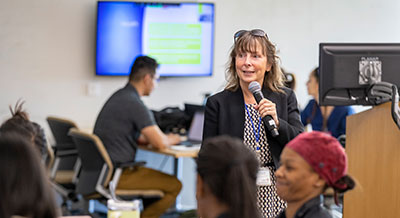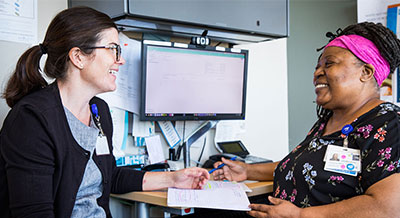While there is plenty of public discussion about gender-affirming health care, “The State of the LGBTQ Community in 2020,” a study by the Center for American Progress, found that 25% of trans and gender nonbinary Americans reported being refused gender-affirming care by a health care provider. And 38% reported that their insurance company denied them gender-affirming hormone therapy.
Long before this topic made headlines in mainstream news outlets, Jacke Humphrey-Straub was working on the front lines in Northern California. Humphrey-Straub is a social worker and member of the Class of 2025 Doctor of Philosophy Program at the Betty Irene Moore School of Nursing at UC Davis. She identifies as queer and nonbinary. A decade ago, she worked at the Gender Health Center in Sacramento, rolling out an advocacy and navigation program. This was the same year the Affordable Care Act (ACA) rolled out, including Section 1557, a clause that barred discrimination against patients based on gender identity.
“We were serving hundreds of transgender patients, providing free gender-affirming hormone care. Some traveled over 50 miles to receive care,” Humphrey-Straub says. “One by one, we educated them about insurance options and their rights to receive this treatment in primary care. It was social justice-based health care that just fueled me. I really see nursing as being leaders in this.”
‘100 hours on the phone’
The ACA seemed like a light of hope for some. For Miles Harris, it was the beginning of a red tape nightmare. While pursuing an accelerated second-degree bachelor’s program in nursing at the University of Pennsylvania, he was among the first who attempted to use a new student insurance benefit that covered gender-affirming surgeries.
“I probably spent 100 hours on the phone with my insurance company that year,” recalls Miles, a trans and nonbinary-identified family nurse practitioner who is an assistant clinical professor at the School of Nursing. “I hoped I would never have to talk to my insurance company the rest of my life.”
His personal experiences with health care have contributed to his advocacy for the integration of gender-affirming care within primary care and becoming an educator of health care students and providers across the United States. It also set the stage for the care delivery model he leads at UC Davis Health and the nursing lens he brings to his work and his patients.
Compassionate care within reach
The health system’s commitment to LGBTQ people dates back more than a decade ago, when it became the first in the nation to incorporate sexual orientation and gender identity in a patient’s health record. That led to a focus from the Office for Health Equity, Diversity and Inclusion on gender-affirming consultation, education and training.
“We recognized that people didn’t know about differences needed in care for LGBTQ people. We felt there should be a resource in our region to do this,” explains Hendry Ton, the office’s associate vice chancellor.
With Harris’s recognized expertise, the goal to create compassionate care is within reach.
“We identified Miles as someone to lead this effort from a clinical standpoint, but also include research and education efforts,” says Olivia Campa, a primary care physician and vice-chair of the Vice Chancellor’s Advisory Committee on Faculty Excellence in Diversity.
“Miles also provides consultation and education to our providers. They must understand the relationship of their clinical work to the gender-affirming care we can provide,” Ton adds.
An advocate for access
Evidence shows that transgender and nonbinary people who have access to gender-affirming care have better health outcomes, including decreased rates of anxiety, depression and suicide. Harris says as much as we have advanced in caring for this population, we still have a long way to go. Recently, he met a patient who was about to pay out-of-pocket for surgery despite his Medi-Cal insurance covering it.
“Most people don’t know their rights and even if they do, it’s very challenging to navigate,” Harris says. “We’re not facing the political climate that other states are, but that does not mean that transgender and nonbinary people have adequate access to health care here.”
Harris envisions a care team of primary care, plastic surgeons, dermatologists, OBGYNs, urologists, ENTs and more. He wants to provide clinical services, community-engaged research, education and training – for providers, students and staff. He sees himself not only as an advanced practice provider, but as an advocate letting patients know he’s on their side.
While Harris’ works to fully realize his vision, Humphrey-Straub prepares for a future of leadership as well.
“I see nursing science and nursing research as leaders in gender-affirming care,” she says. “Nurses have value thinking about social determinants of health and health equity and that’s really at the center of this issue.”






